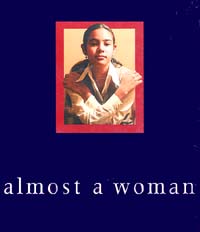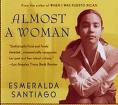
BIOGRAPHY - CRITICISM
Esmeralda Santiago was born in Puerto Rico, the eldest of eleven
children raised by a single mother. When she was thirteen years old, the
family moved to Brooklyn, New York. Within two years, she had learned
enough English to be accepted into the prestigious Performing Arts High
School. She spent eight years studying part-time at community colleges
while working full-time, until she was accepted as a transfer student to
Harvard University with a full scholarship and received her Master's
degree from Sarah Lawrence College. Upon graduating magna cum laude in
1976, she and Frank Cantor, her husband, founded Cantomedia, a film and
production company that has won numerous awards for excellence in
documentary filmmaking. She has done extensive work for victims of
domestic violence, including helping found a Youth Service Center and a
shelter for battered women in Massachusetts.
 Her first book, a memoir of her
childhood entitled When I Was Puerto Rican appeared in 1993 to
great critical acclaim. She soon followed this memoir with the novel
America's Dream. Her most recent novel is entitled Almost a Woman.
Aside from her achievements as a writer, Esmeralda Santiago is also an
editor. Her work as an editor may be seen in Las Christmas: Favorite
Latino Authors Share Their Holiday Memories. Currently, Santiago lives in
Westchester County, New York, with her husband and two children. Her first book, a memoir of her
childhood entitled When I Was Puerto Rican appeared in 1993 to
great critical acclaim. She soon followed this memoir with the novel
America's Dream. Her most recent novel is entitled Almost a Woman.
Aside from her achievements as a writer, Esmeralda Santiago is also an
editor. Her work as an editor may be seen in Las Christmas: Favorite
Latino Authors Share Their Holiday Memories. Currently, Santiago lives in
Westchester County, New York, with her husband and two children.
Santiago's memoir of her Puerto Rican childhood culminates in her move
to New York, where she gained an education, but lost the sense of
belonging, within a family and within a culture, once so strong in her
childhood. Santiago gives the point of view of the child in the earlier
sections of the memoir. "Santiago's autobiographical account cinematically
recaptures her past and her island culture. What is particularly appealing
about Santiago's story is the insight it offers to readers unaware of the
double bind Puerto Rican Americans find themselves in: the identity in
conflict. Is [she] black or white? Is she rural or urban? Even more
importantly, is she Puerto Rican or is she American? [One] can only be
grateful that Esmeralda Santiago has chosen to explore her culture and
share what she has found." (The Los Angeles Times Book Review)
Santiago communicates the textures of life (how to eat a guava, the
ceremony for ushering a dead baby's soul to heaven) in Puerto Rico most
vividly, while at the same time dealing concretely with family
relationships and conflicts. Her journey to a new country, like that of
many Puerto Ricans touched on in her book, captures the experience of many
American immigrant groups.
Santiago refers to her memoir, "When I began writing [When I Was
Puerto Rican], I had no idea it would result in a dialogue about
cultural identity. But as I've traveled around the country talking about
it, people tell me that, while the culture I'm describing may not be the
same as the one they grew up in, the feelings and experiences are
familiar, and some of the events could have been taken from their own
lives. It has been particularly poignant to speak to immigrants who have
returned to their countries, only to discover how much they have changed
by immersion in North American culture. They accept and understand the
irony of the past tense in the title, the feeling that, while at one time
they could not identify themselves as anything but the nationality to
which they were born, once they've lived in the U.S. their 'cultural
purity' has been compromised, and they no longer fit as well in their
native countries, nor do they feel one hundred percent comfortable as
Americans."
The merging of two cultures proves to be a challenge to many immigrants,
and Santiago explores these difficulties of change in her memoir. In her
words, hopes of finding a balance between the two cultures is of utmost
importance. In finding the balance, merging the past with the future,
perhaps Santiago will be able to understand and claim her identity. "When
I returned to Puerto Rico after living in New York for seven years, I was
told I was no longer Puerto Rican because my Spanish was rusty, my gaze
too direct, my personality too assertive for a Puerto Rican woman, and I
refused to eat some of the traditional foods like morcilla and tripe stew.
I felt as Puerto Rican as when I left the island, but to those who had
never left, I was contaminated by Americanisms, and therefore, had become
less than Puerto Rican. Yet, in the United States, my darkness, my
accented speech, my frequent lapses into the confused silence between
English and Spanish identified me as foreign, non-American. In writing the
book I wanted to get back to that feeling of Puertoricanness I had before
I came here. Its title reflects who I was then, and asks, who am I today?"
The novel America's Dream shares similar themes to When I Was
Puerto Rican. The novel may be seen in light of cultural
identification, as the main character America merges her Puerto Rican
culture with that of the American culture. However, there is also another
theme that permeates the novel. The relationships of mothers and daughters
and the time of childhood, appear to be one of the focal points of the
novel. "This coming of age memoir will reintroduce you to childhood. . . .
It will speak to anyone who . . . recalls a child's bittersweet loss of
innocence and to anyone who simply enjoys good writing." (Miami Herald)
America's relationship with her mother as well as her daughter depicts the
cycle of womanhood and motherhood, that exists in the Puerto Rican culture.
In America's effort to overcome the limitations given to the cycle of
womanhood and motherhood, she faces the challenge of not losing her bond
with both her mother and her daughter. The novel explores the complexity
of maintaining rather than severing the bond that exists between the two,
despite distance and hardships.
Another relationship explored in the novel by Santiago is the cycle of
abusive relationships, which is seen through America's relationship with
her boyfriend, Correa, who is the father of her daughter. Santiago, in
writing this novel, illustrates the challenges of a woman in the Puerto
Rican culture. The difficulty of rising from lower class society and
making a future for oneself seems almost unattainable. America's dream
signifies the hope in change. In dreaming of having her own home, driving
her own car, and having an ideal family, America takes the reader through
an emotional and psychological journey into the challenges of many Latina
women.
It is Santiago's eloquence with words that capture the essence of her
writing style and her search for cultural identity. Using words as her
medium, Santiago paints a beautiful picture of her life. Santiago writes
with such clarity and fierceness that it is impossible for any person not
to see, feel and understand what she went through in her remarkable
journey.
Santiago's style allows for easy reading while providing deep insights
about cultural identity. Whether through personal conflicts about
searching for one's identity or overcoming trials and fears that accompany
such a search, Santiago captures these experiences in showing how strong
will and determination can defeat even the most difficult circumstances.
Works by the Author:
Works edited by the Author:
| Las Mamis (2000)
|
Las Christmas: Favorite Latino Authors Share Their Holiday Memories
(1998) |
 |
 |
MY ARTICLES:
SELECTED
BIBLIOGRAPHY: (Works about the Author)
 |
ACOSTA CRUZ, Maria I.
“Esmeralda
Santiago in the Marketplace of Identity Politics.” Centro Journal
18.1 (2006): 170-187. |
 |
Aguinaco, Carmen. "Creative Tension: How Latina Writers Sense Two
Worlds." U.S. Catholic (1999): 34-35. |
 |
Berch, Bettina. "Drinking in the Rain."
Belles Lettres 10
(1995): 36. |
 |
COPELAND, Libby Ingrid. “Cultural
Go-Between: Author Esmeralda Santiago’s Two Languages and Two Lives.”
The Washington Post 12 Nov. 1998, final ed.: C1. |
 |
EVERLINE, Theresa. America’s Dream by
Esmeralda Santiago” The Boston Book Review http://www.bookwire.com/BBR/Fiction-and-Criticism/.read.Revie$2510
6/05/98 |
 |
Gatto, Katherine Gyekenyesi. "Mambo,
Merengue, Salsa: The Dynamics of Self-Construction in Latina
Autobiographical Narrative." West Virginia University Philological
Papers 46 (2000): 84-90. |
 |
Kevane, Bridget and Juanita Heredia. “A
Puerto Rican Existentialist in Brooklyn: An Interview with Esmeralda
Santiago , Latina Self-Portraits: Interviews with Contemporary
Women Writers. Albuquerque: University of New Mexico Press, 1999,
125-139. |
 |
Khader, Jamil Y. "Cartographies of Dislocation: Post Colonialism,
Transnationalism, and Third World Feminism." Diss. The Pennsylvannia State
University, 1998. Dissertation Abstracts Online. 60 (1998):118.
|
 |
Koch, John. "Esmeralda Santiago: The
Interview." The Boston Globe 30 Sept. 1998: Magazine 10.
|
 |
Galullo, Lisa,
"Truth and Identity in Autobiography: Teaching Esmeralda Santiago's novel
When I Was Puerto Rican," |
 |
Greene, Donna. "Esmeralda Santiago: Author
Speaks for Puerto Rican Women." The New York Times 13 Apr. 1997:
13WC. |
 |
GONZÁLEZ, Flora. “The Writer as Mediator in
Esmeralda Santiago’s When I Was Puerto Rican.” Latinos in the U.S.
Review (1994): 45-48. |
 |
Hernández, Carmen Dolores. "Esmeralda
Santiago" Puerto Rican Voices in English: Interviews with Writers.
Westport, CT: Praeger, 1997, 157-169. |
 |
Holmes, Amanda. The Spatial Self: Remembering
the Caribbean Diaspora in Esmeralda Santiago, Jamaica Kincaid and Cristina
García.” Revista Canadiense de Estudios Hispánicos, (30:1), 2005
Fall, 109-28. |
 |
Langer, Irina Rich. "A Lesson In Turning Memories Into Memoirs."
New York Times. (April 2, 2000): 15. |
 |
MARQUEZ, Roberto. "De Boricuas, Jibaras y
Jibaristas: Memory, Memoir and Mimicry." Rev. of When I Was Puerto Rican,
by Esmeralda Santiago. Latino Review of Books Spring 1996: 30-31 |
 |
Martinez, Elizabeth Coonrod. "Maid in the USA." Women's Review of
Books 14 (1996): 22 |
 |
Mayock, Ellen. "Bicultural Construction of
Self in Cisneros, Alvarez, and Santiago." Bilingual Review La Revista
Bilingue 1998 23.3 (1998): 223-29. |
 |
Meacham, Jack. "Transforming a Developmental Psychology Corse to
Reflect Students' Diverisity." Transformations 10 (1999): 26.
|
 |
MULLER, Gilbert H. “Metropolitan Dreams:
Latino Voyagers from the Caribbean, Puerto Ricans and the promised land” (Sobre
Mohr, Santiago y Cofer). New Strangers in Paradise: The immigrant
Experience and Contemporary American Fiction. Lexington: University
Press of Kentucky, 1999, 93-137. |
 |
Puleo, Gus. "Dance Between Two Cultures: Latino Caribbean Literature
Written in the United States." Hispanic Review 67 (1999): 407-411.
|
 |
Szadziuk, Maria. "Culture as transition: Becoming a woman in bi-ethnic
space." Mosaic: A Journal for the Interdisciplinary Study of Literature
32 (1999): 109-129. |
 |
Gac-Artigas, Priscilla.
Mis obras se alimentan de todo lo que veo... y de una imaginación que
no descansa aún cuando estoy dormida. Entrevista a Esmeralda Santiago,
Dra. Priscilla Gac-Artigas. |
 |
Martinez, Elizabeth Coonrod. "Maid in the
USA." Women's Review of Books 14 (1996): 22. |
 |
Mayock, Ellen.
" Sueños y palabras en la obra de Esmeralda Santiago |
 |
Noguera, Nancy. Nación, espacio y cuerpo en
Cuando era puertorriqueña de Esmeralda Santiago” Actual, (3:55-56),
2004 Aug, 63-78. |
 |
Raventós Conill, Mª Dolores.
“Belleza, Etnicidad
y Condición femenina en la novela de Esmeralda Santiago When I Was Puerto
Rican.” Belleza escrita en femenino. Barcelona: Centre Dona i
Literatura, 1998, col. Mujeres y Literaturas |
 |
Rivera, Carmen S. Chapter 1: “Esmeralda
Santiago and the Bildungsroman of El Barrio.” Kissing the Mango Tree:
Puerto Rican Women Rewriting American Literatura. Houston: Arte
Público Press, 2002. |
 |
Rivera Villegas, Carmen M. "Review of Almost
a Woman by Esmeralda Santiago." Latino(a) Research Review, volume 4
(1999). |
 |
RODRÍGUEZ, Linda. “Esmerlada Santiago,
América’s Dream.” Caribbean Writer On Line Book Review http://www.uvi.edu/extension/Writer/online/review/americasdream.html
6/05/98 |
 |
RODRIGUEZ-VECHINI, Hugo. "Cuando Esmeralda
era Puertorriqueña: Autobiografía etnográfica y autobiografía picaresca."
Nomada 1995 Abriul, 145-60. |
 |
Rojo, Ana Leonor.
"Esmeralda Santiago and The Latino Collective Memory " El andar
(Spring 2000): Online |
 |
Sapia, Yvonne V. "The Americanization of
Esmeralda; When I Was Puerto Rican." Los Angeles Times 26 Dec. 1993: Book
Review 9. |
 |
Schmidt, Alleen. “Writing a Life: When I Was
Puerto Rican by Esmeralda Santiago.” In AUGENBRAUM, Harold and Margarite
Fernández Olmos (eds.). U.S. Latino Literature: A critical Guide for
Students and Teachers. Wesport: Greenwood Press, 2000, 135-144. |
 |
Sprouse, Keith Alan. "Between Bilingue and
Nilingue: Language and the Translation of Identity in Esmeralda Santiago's
Memoirs." American Studies in Scandinavia 32.1 (2000): 106-116 |
 |
Szadziuk, Maria. "Culture as Transition:
Becoming a Woman in Bi-ethnic Space (An Examination of the
Autobiographical Narratives of Esmeralda Santiago, Sandra Cisneros and
Cherrie Moraga)." Mosaic--A Journal for the Interdisciplinary Study of
Literature 32.3 (1999): 109-129. |
 |
Torres-Robles, Carmen L. "Esmeralda Santiago:
hacia una (re)definición de la puertorriqueñidad. (Spanish)." Bilingual
Review 23.3 (1998): 206-213. |
 |
Valdes, Alisa. "Santiago's triumphant
American 'Dream'." The Boston Globe 31 Jul. 1996: E3. |
 |
VÁSQUEZ, Mary. "La forja de la identidad
narrativa: When I Was Puerto Rican de Esmeralda Santiago." Modalidades
del sujeto Auto/bio/grafico femenino. Coleccion Andamios. Eds. Magdalena
Ruiz and Luis H. Penha. San Nicolas de la Garza, N.L.: Pub. de U.
Autonoma de Nuevo Leon, 1997. 111-127 |
 |
Entrevista en "La Ventana" con Esmeralda Santiago |
RELATED LINKS
 |
Esmeralda Santiago's Webpage |
 |
Almost a Woman
www.ncteamericancollection.org/almost_a_woman.htm
Hosted by NCTE, this site, created by teachers, offers biographical
information and Web links. |
 |
Reading Group Center
 |
A note to the reader from Santiago.
|
|
 |
Splendid
Table Recipe Box
|
 |
www.esmeraldasantiago.com
Designed by the author, it offers information about herself and her books,
and an invitation to write to her. |
 |
www.albany.edu/celac/docs.lrb/v4n1.htm
Ana Leonor Rojo's article "Esmeralda Santiago and the Latino Collective
Memory" appeared in El Andar in Spring 2000. |
 |
www.elandar.com/back/spring00/stories/story_esantiago.html
Maria Szadziuk wrote about many of the issues addressed in Almost A Woman
in "Culture as Transition: Becoming a Woman in Bi-Ethnic Space" for Mosaic:
A Journal for the Interdisciplinary Study of Literature 32 (1999). |
 |
www.randomhouse.com/vintage/read/puerto/santiago.html
www.randomhouse.com/vintage/read/puerto
www.randomhouse.com/vintage/read/almost/
These three pages on the Vintage Books Reading Group Guides site include
topics for discussion, questions, and suggestions for further reading for
When I Was Puerto Rican and Almost a Woman, as well as a biography of
Esmeralda Santiago. |
 |
www.yale.edu/ynhti/curriculum/units/2000/1/00.01.intro.x.html
Part of Women Writers in Latin America 2000 Volume I, Lisa Galullo's
curriculum, "Truth and Identity in Autobiography: Teaching Esmeralda
Santiago's novel When I Was Puerto Rican," analyzes autobiography and its
literary devices in the memoir. |
 |
Bair, Erin and Joyn Coyle. "Interview with
Esmeralda Santiago."
http://hcs.harvard.edu/~hbr/fall99/santiago.html. Accessed on 14 July
2002. |
|
|

 Her first book, a memoir of her
childhood entitled When I Was Puerto Rican appeared in 1993 to
great critical acclaim. She soon followed this memoir with the novel
America's Dream. Her most recent novel is entitled Almost a Woman.
Aside from her achievements as a writer, Esmeralda Santiago is also an
editor. Her work as an editor may be seen in Las Christmas: Favorite
Latino Authors Share Their Holiday Memories. Currently, Santiago lives in
Westchester County, New York, with her husband and two children.
Her first book, a memoir of her
childhood entitled When I Was Puerto Rican appeared in 1993 to
great critical acclaim. She soon followed this memoir with the novel
America's Dream. Her most recent novel is entitled Almost a Woman.
Aside from her achievements as a writer, Esmeralda Santiago is also an
editor. Her work as an editor may be seen in Las Christmas: Favorite
Latino Authors Share Their Holiday Memories. Currently, Santiago lives in
Westchester County, New York, with her husband and two children.





